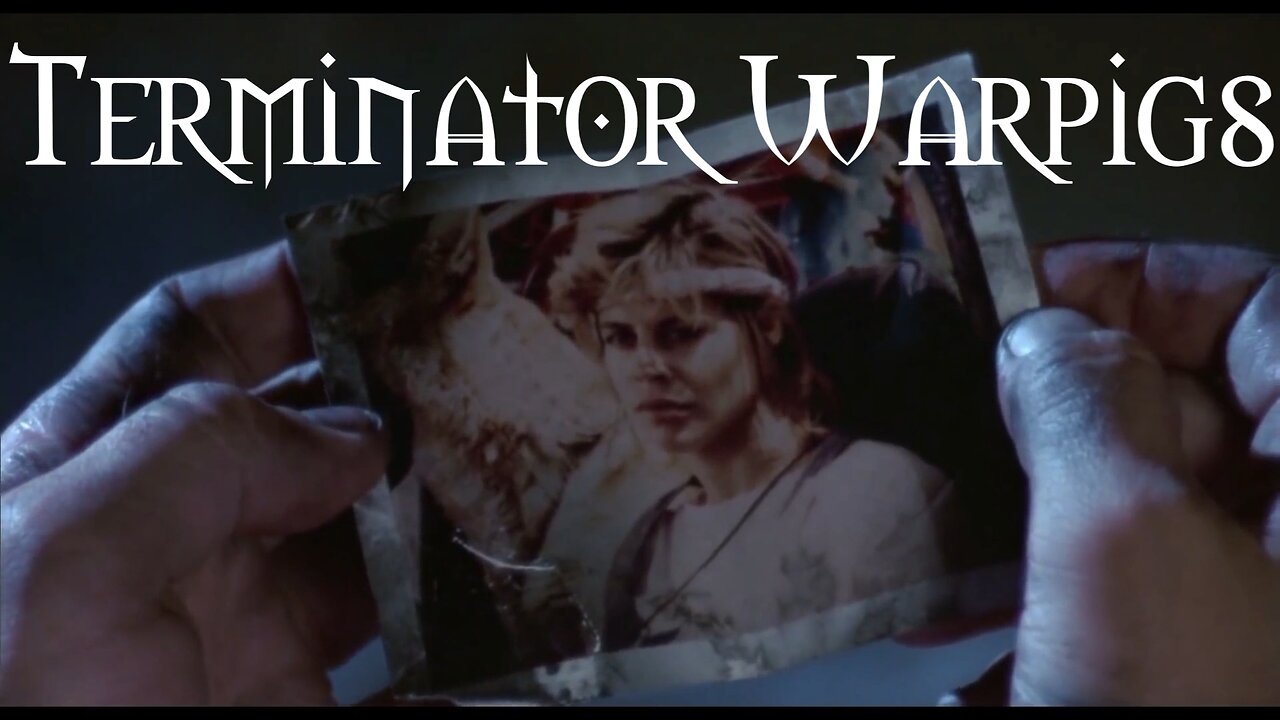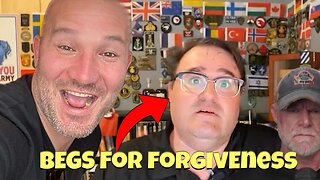Premium Only Content

Terminator Warpigs
The Terminator is a 1984 American science fiction action film directed by James Cameron. It stars Arnold Schwarzenegger as the Terminator, a cyborg assassin sent back in time from 2029 to 1984 to kill Sarah Connor (Linda Hamilton), whose unborn son will one day save mankind from extinction by Skynet, a hostile artificial intelligence in a post-apocalyptic future. Kyle Reese (Michael Biehn) is a soldier sent back in time to protect Sarah. The screenplay is credited to Cameron and producer Gale Anne Hurd, while co-writer William Wisher Jr. received an "additional dialogue" credit.
Cameron devised the premise of the film from a fever dream he experienced during the release of his first film, Piranha II: The Spawning (1982), in Rome, and developed the concept in collaboration with Wisher. He sold the rights to the project to fellow New World Pictures alumna Hurd on the condition that she would produce the film only if he were to direct it; Hurd eventually secured a distribution deal with Orion Pictures, while executive producers John Daly and Derek Gibson of Hemdale Film Corporation were instrumental in setting up the film's financing and production. Originally approached by Orion for the role of Reese, Schwarzenegger agreed to play the title character after befriending Cameron. Filming, which took place mostly at night on location in Los Angeles, was delayed because of Schwarzenegger's commitments to Conan the Destroyer (1984), during which Cameron found time to work on the scripts for Rambo: First Blood Part II (1985) and Aliens (1986). The film's special effects, which included miniatures and stop-motion animation, were created by a team of artists led by Stan Winston and Gene Warren Jr.
Defying low pre-release expectations, The Terminator topped the United States box office for two weeks, eventually grossing $78.3 million against a modest $6.4 million budget. It is credited with launching Cameron's film career and solidifying Schwarzenegger's status as a leading man. The film was followed by a series of films, including Terminator 3: Rise of the Machines (2003), Terminator Salvation (2009), Terminator Genisys (2015), and Terminator: Dark Fate (2019), as well as a 2008 television series. In 2008, The Terminator was selected by the Library of Congress for preservation in the United States National Film Registry as "culturally, historically, or aesthetically significant".
Terminator 2: Judgment Day[a] is a 1991 American science-fiction action film directed by James Cameron, who co-wrote the script with William Wisher. Starring Arnold Schwarzenegger, Linda Hamilton, Robert Patrick, and Edward Furlong, it is the sequel to The Terminator (1984) and is the second installment in the Terminator franchise. In its plot, the malevolent artificial intelligence Skynet sends a Terminator—a highly advanced killing machine—back in time to 1995 to kill the future leader of the human resistance, John Connor, when he is a child. The resistance sends back a less-advanced, reprogrammed Terminator to protect Connor and ensure the future of humanity.
The Terminator was considered a significant success, enhancing Schwarzenegger's and Cameron's careers, but work on a sequel stalled because of animosity between the pair and Hemdale Film Corporation, which partially owned the film's rights. In 1990, Schwarzenegger and Cameron persuaded Carolco Pictures to purchase the rights from The Terminator producer Gale Anne Hurd and Hemdale, which was financially struggling. A release date was set for the following year, leaving Cameron and Wisher seven weeks to write the script. The pair frequently conferred with the special-effects studio Industrial Light & Magic (ILM) to determine whether their ideas for extensive special effects were possible. Principal photography began in October 1990 and lasted until March 1991, taking place in and around Los Angeles on an estimated $94–102 million budget, making it the most-expensive film made at the time. The advanced visual effects, which include the first use of a computer-generated main character in a blockbuster film, resulted in a schedule overrun, and theatrical prints were not delivered to theaters until the night before its July 3, 1991 release.
Terminator 2 earned $519–520.9 million, making it the highest-grossing film of 1991 worldwide, and the third highest-grossing film of its time. Critics praised the visual effects, action sequences and cast, choosing Patrick's performance as the T-1000 as a great cinematic villain, while criticism was directed towards the film's violent content. Terminator 2 won several accolades, including Saturn, BAFTA, and Academy awards. Terminator 2 merchandise includes video games, comic books, novels, and T2-3D: Battle Across Time, a live-action attraction.
Terminator 2 is considered one of the best films ever made, and one of the best science-fiction, action, and sequel films, as well as equal to or better than The Terminator. It is also seen as one of the most influential visual effects films of all time, beginning the transition from practical effects to reliance on computer-generated imagery. Although Cameron intended for Terminator 2 to be the end of the franchise, it was followed by a series of films, including Terminator 3: Rise of the Machines (2003), Terminator Salvation (2009), Terminator Genisys (2015), and Terminator: Dark Fate (2019), as well as a 2008 television series.
In 2029, Earth is a wasteland dominated by the war between the malevolent artificial intelligence (AI) Skynet and the human resistance. Skynet sends the T-1000—an advanced, prototype, shape-shifting Terminator made of virtually indestructible liquid metal—back in time to kill the resistance leader John Connor when he is a child. To protect Connor, the resistance sends back a reprogrammed T-800 Terminator, a less-advanced metal endoskeleton that is covered in synthetic flesh.
In 1995 Los Angeles, John's mother Sarah has been incarcerated at the Pescadero State Hospital for her violent, fanatical efforts to prevent "Judgment Day"—the prophesied events of August 29, 1997, when Skynet will gain sentience and, in response to its creators' attempts to deactivate it, incite a nuclear holocaust. John is taken in by foster parents. He considers Sarah's beliefs to be delusional and resents her efforts to prepare him for his future role.
The original title of "War Pigs" was "Walpurgis", dealing with the witches' sabbath. "Walpurgis is sort of like Christmas for Satanists. And to me, war was the big Satan", said bassist and lyricist Geezer Butler. "It wasn’t about politics or government or anything. It was Evil itself. So I was saying 'generals gathered in the masses / just like witches at black masses' to make an analogy. But when we brought it to the record company, they thought 'Walpurgis' sounded too Satanic. And that's when we turned it into 'War Pigs'. But we didn't change the lyrics, because they were already finished."
During this time period, mandatory army service had recently ended in Britain but with the Vietnam War raging, many young men feared they'd be conscripted to fight in it. "That's what started this whole rebellion thing about not going to war for anybody", said Butler. "I was dreading being called up", the lyricist recalled.
Prior to its official release, the band often altered the lyrics significantly when performing it live. An example of this can be found on Ozzy Osbourne's compilation The Ozzman Cometh, which features an early version recorded by Black Sabbath for BBC Radio 1 on 26 April 1970. While Butler has said that "War Pigs" is "totally against the Vietnam War, about how these rich politicians and rich people start all the wars for their benefit and get all the poor people to die for them", vocalist Osbourne has stated that the group "knew nothing about Vietnam. It's just an anti-war song." The song's instrumental outro is entitled "Luke's Wall" on US releases of the album, formatted as "War Pigs/Luke's Wall".
Drummer Bill Ward's first memory of performing the song was at The Beat Club in Switzerland in 1968. The band was required to play multiple sets every night and had little material in their repertoire at that point, so they would perform lengthy jam sessions to fill in the sets. Co-writer and lead guitarist Tony Iommi has said that "War Pigs" originated from one of those jam sessions.
The addition of the air-raid siren and the speeding up of the song's end were done by producer Rodger Bain and engineer Tom Allom. The band had no input in these decisions, though they were pleased with the results.
-
 16:00
16:00
Psychological operations
10 days agoShut 'Em Down Bring Tha Noize Ft. Anthrax He Got Game Public Enemy
56 -
 9:26
9:26
Jamesons Travels
1 day ago $5.11 earnedShawn Ryan CLOWNS Intel Expert & It GETS WEIRD!
30.5K5 -
 2:09:52
2:09:52
Jewels Jones Live ®
1 day agoTRUMP'S GOLDEN AGE | A Political Rendezvous - Ep. 105
43K29 -
 1:14:28
1:14:28
Michael Franzese
17 hours agoThe Hidden Cause of LA's Deadliest Fires in 2025?
68.2K141 -
 3:59:45
3:59:45
Bitcoin Sports Network
10 hours agoMax & Stacy Invitational Day 2 Part 1 - LIVE from El Salvador
132K11 -
 1:34:30
1:34:30
The Criminal Connection Podcast
5 days ago $2.48 earnedEL PACO: Gypsy Family Wars, Bare Knuckle Boxing, Assassinations and Spirits!
61.3K4 -
 51:43
51:43
Brewzle
1 day agoI Found Some AWESOME Stores Bourbon Hunting in Des Moines, IA
52K3 -
 1:16:54
1:16:54
Kyle Rittenhouse Presents: Tactically Inappropriate
1 day ago $3.74 earnedReplacing Matt Gaetz Pt. 2
34.1K15 -
 16:08
16:08
inspirePlay
1 day ago $0.90 earnedCan You Sniff Out the Golf Imposters Before They Wreck the Score?
26.3K4 -
 22:57
22:57
RTT: Guns & Gear
1 day ago $4.98 earnedPSA Dagger vs. Bear Creek Arsenal BC-102 | The Better Pistol For The Poors
50.6K11